Menu

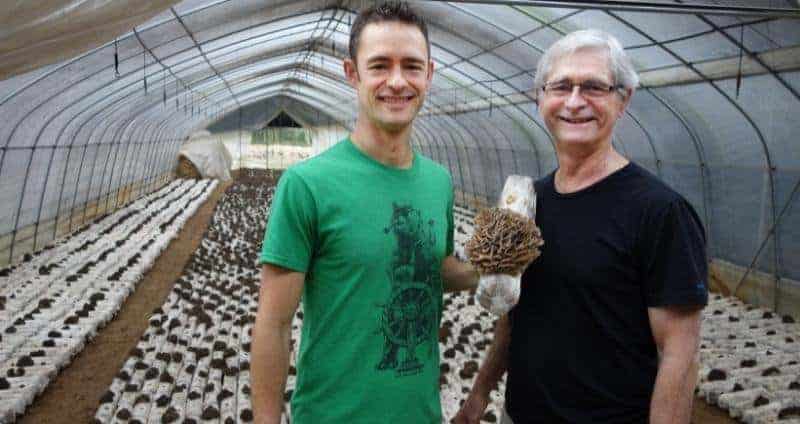
Jason Vergara from World Mushroom Society recently got in touch with Skye Chilton, the founder of Real Mushrooms, He did a Q&A to profile Skye and the growth of his successful mushroom business.
Check out the interview below covering Skye’s journey with medicinal mushrooms, how to identify a top-quality medicinal mushroom product, and some insights into the North American medicinal mushroom supplement industry.
You can view the original blog post here: https://worldmushroomsociety.com/interview-with-skye-chilton-founder-of-real-mushrooms/
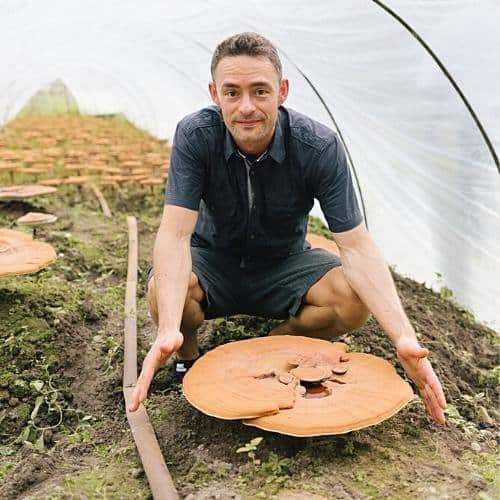
a. I’ve been around mushrooms for most of my life via my father, Jeff Chilton, founder of Nammex. I didn’t picture myself being involved with mushrooms but through many conversations with my father and reconnecting with my personal health, I came to realize that mushrooms are a unique food as well as have the potential for a host of other health benefits.
a. Real Mushrooms came into existence through long talks with my father, discussing the current landscape of the mushroom industry. I learned that it was primarily dominated by mycelium, the root system of the mushroom, that was being grown on sterilized grain and improperly labeled as mushrooms.
With this knowledge, I wanted to showcase the mushroom itself and educate consumers about the differences in products while being entirely transparent about where our mushrooms come from and why. The name Real Mushrooms came from the fact that we actually use mushrooms in our products.
“Most brands do not test for active compounds and solely rely on hype and marketing.” - Skye Chilton
We have a streamlined supply chain through our relationship with Nammex and very close relationships with our manufacturing partners in China. We do more testing than any other company out there. This testing demonstrates that the important fungal compounds that give these mushrooms their benefits are actually in our products. Most brands do not test for active compounds and solely rely on hype and marketing.
a. We’ve recently launched our line of mushroom supplements for pets in early 2022 headed up by our Chief Veterinary Officer, Dr. Rob Silver DMS, MS. He is a conventional veterinarian as well as a holistic veterinarian, cannabis, and mushroom expert. He has over 40 years of veterinary practice as well as 25 years of experience developing products for pets.
a. The biggest challenge has been differentiating ourselves from myceliated grain competitors and educating consumers on the differences between mushrooms and mycelium. The mushroom business industry is full of misleading labeling that can obscure what consumers are actually getting in their mushroom products.
a. Typically bolstering immunity whether it’s for general health or some sort of adjunct therapy protocol to support conventional cancer treatment. Using mushroom supplements to support mental health and restful sleep is also becoming very common.
a. I see the mushroom business opportunities continuing to expand as consumers learn more about the benefits of eating functional mushrooms. More and more products will start to contain mushrooms and hopefully there will be a more reasonably priced, broad selection of culinary mushrooms at your local grocery store.
a. Our goal has always been to produce a high-quality extract from organic mushrooms (fruiting bodies). As mushrooms are bio-accumulators, organically grown mushrooms are important because they are grown without the use of pesticides and agricultural chemicals.
Extraction method is another important factor as the active compounds in these mushrooms are locked up in the cell wall which is made up of chitin (yes, the same thing that crabs make their shells from). Extraction breaks down the cell wall allowing our bodies to absorb these compounds. Beta-glucans are the primary active compounds in these mushrooms so look for measurement of beta-glucans in the Supplement Facts panel to ensure that these compounds are guaranteed in any product you purchase.
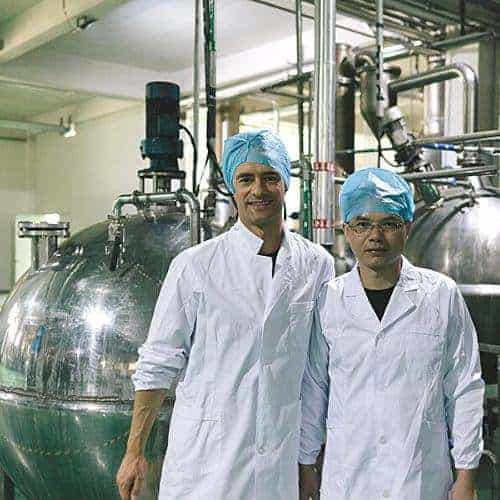
“Beta-glucans are the primary active compounds in these mushrooms so look for measurement of beta-glucans in the Supplement Facts panel to ensure that these compounds are guaranteed in any product you purchase.”
a. Try to discern if the product is made from mushroom or mycelium. This is extremely important as the majority of mycelium-based products are grown on a grain substrate and this leftover grain ends up in the final product, diluting the mycelium and active compounds.
Polysaccharide measurements are usually a red flag as polysaccharides are a large group of compounds including fungal beta-glucans as well as starches found in grain. For example, a product could tout high polysaccharides numbers but the majority of it could be coming from grain starch or other starch-like fillers; not fungal beta-glucans.
a. I have no issues with the use of the mycelium but it is important that products are labeled properly and that any residual substrate the mycelium is grown on be properly disclosed on the label. Many mycelium-based products are improperly labeled to make consumers think the product contains mushrooms. FDA regulations prohibit implying that the product contains mushrooms when it does not.
b. There is a lot of research on mycelium but the important caveat is that it is primarily based on pure mycelium made through liquid fermentation or pure compounds isolated from the mycelium. While there are pure mycelium products like Cordyceps Cs-4, PSK, PSP, these products are out of Asia where they utilize a liquid fermentation process. By growing the mycelium in a liquid media, once you drain off the liquid, only pure mycelium remains.
c. Mycelium in the North American market is dominated by solid-state mycelium; using grain as the growth media. The final product is very different from pure mycelium as it still contains the grain substrate that dominates most of the finished product. This residual substrate dilutes the amount of mycelium present and hence dilutes any active compounds. This has been proven by many scientific studies.
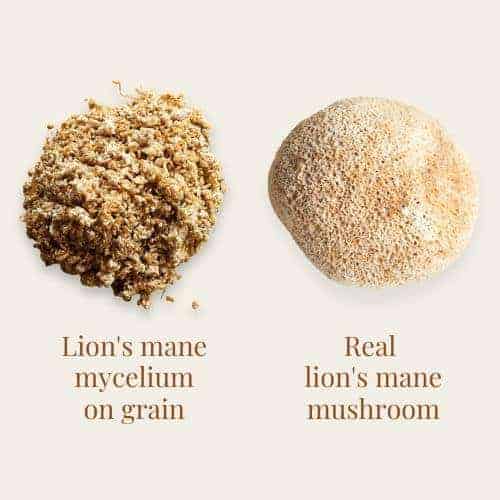
a. There are many different reasons. Some of it is just the current anti-China sentiment used as a scare tactic. Certainly, I wouldn’t buy from a random mushroom business off of Alibaba which is why it is important to buy from a brand that does proper testing and qualification. All of our mushroom ingredients get screened upwards of 3 times for pesticides, heavy metals, and microbial contamination before they reach the customer.
b. While I totally support buying local, many of these brands are not selling mushrooms when they’re talking about locally grown and are really selling myceliated grain because it is much cheaper to produce than growing mushrooms for extract powders. Growing organic mushrooms in North America to create extract powders is not economical which is why myceliated grain is grown instead.
c. Many forget that China is the birthplace of mushroom cultivation over 800 years ago and they now grow over 90% of the world’s mushrooms. Mushrooms are one of their top agricultural crops and they promote mushroom growing as a way to help communities out of poverty. They have dedicated research institutes for mushrooms and the most mushroom scientists of any country. These mushrooms have been used in China as functional foods for thousands of years.
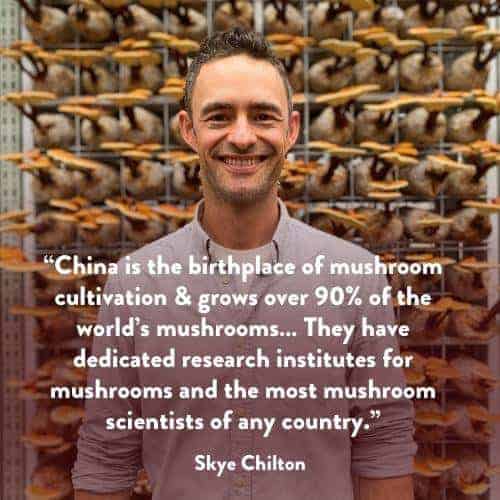
a. It really depends on the mushroom and your desired results. We use a variety of extraction techniques. For reishi, we use a concentrated dual extract to get higher levels of the bitter triterpenes which we guarantee on our label. For lion’s mane, we use a lossless hot water extract which is more consistent with the clinical data.
b. With any extraction method, you need to verify your results. We’ve seen reishi mushroom hot water extracts with more triterpenes than reishi mushroom dual extracts. If you’re not analyzing the important compounds then it’s basically marketing speak.
a. I think this is a great new area of research and am I glad that this is getting more exposure and people are seeing benefits. It is good to see it following behind the decriminalization of cannabis. While psilocybin could cross over into functional mushrooms at some point, it will most likely be its own category to start.
When consuming psilocybe mushrooms, it is important to remember the set and setting. Make sure you are around people who can help you if anything goes wrong. Psilocybin can produce negative experiences so if you are looking for specific outcomes, make sure to get in touch with a qualified practitioner.
a. In Asia, many large studies that investigated the diets of various populations discovered that those groups who consumed mushrooms regularly actually lived longer. Considering the benefits of mushroom beta-glucans for our immunity as well the presence of longevity compounds like ergothioneine, I consider these studies to be a validation of the use of mushrooms for food and as nutritional supplements.
a. Reishi mushroom would probably be my favorite as it is so multi-faceted.
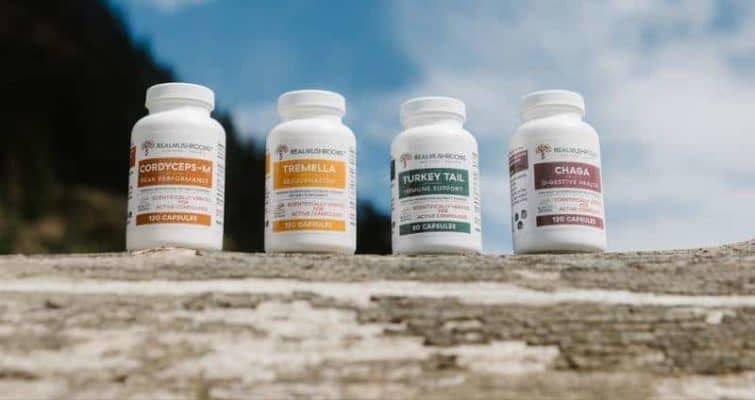
Disclaimer: The information or products mentioned in this article are provided as information resources only, and are not to be used or relied on to diagnose, treat, cure, or prevent any disease. This information does not create any patient-doctor relationship, and should not be used as a substitute for professional diagnosis and treatment. The information is intended for health care professionals only. The statements made in this article have not been evaluated by the Food and Drug Administration. Any products mentioned are not intended to diagnose, treat, cure, or prevent any disease. The information in this article is intended for educational purposes. The information is not intended to replace medical advice offered by licensed medical physicians. Please consult your doctor or health practitioner for any medical advice.